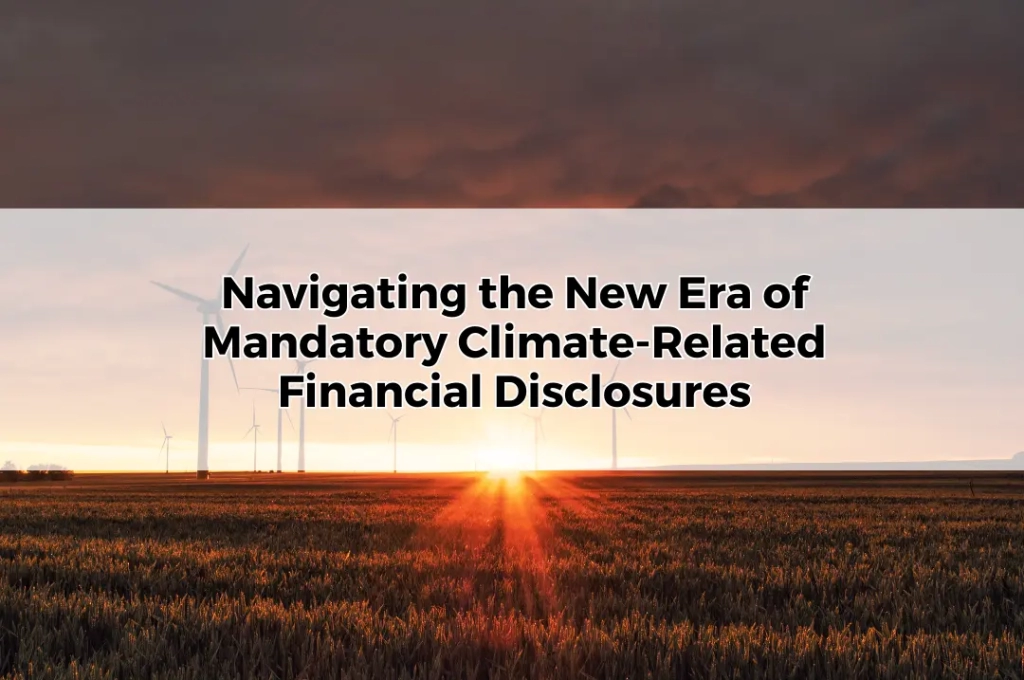The New Era of Mandatory Climate-Related Financial Disclosures
Table of Contents
ToggleIn 2024, Australia is set to embark on a transformative journey towards sustainability and environmental accountability. The introduction of mandatory climate-related financial disclosure requirements signifies a pivotal shift in the corporate landscape, aligning with global trends in environmental, social, and governance (ESG) principles. This initiative is not merely regulatory; it represents Australia’s commitment to leading the charge against climate change, fostering a business ecosystem that values transparency, accountability, and sustainability.
Understanding the Mandatory Disclosure Requirements
Detailed Overview
The Australian government’s forthcoming regulations mandate that companies and financial institutions disclose their climate-related risks, strategies, and operational impacts. This includes detailed reporting on governance structures for climate risk management, strategic planning to address these risks, and specific metrics and targets, such as greenhouse gas emissions. The purpose is to illuminate the business’s engagement with climate issues, offering stakeholders a transparent view of its environmental stewardship.
Scope and Impact
All large businesses and financial institutions will find themselves within the ambit of these regulations. This broad application ensures that a significant segment of the economy contributes to national and global sustainability efforts. The move aims to integrate environmental considerations into the core strategic and operational frameworks of businesses, driving systemic change towards sustainable practices.
Rationale and Expected Outcomes
The drive towards these disclosures stems from a growing recognition of the financial sector’s role in combatting climate change. By mandating transparency, the government seeks to promote a more informed investment landscape, encourage sustainable business practices, and facilitate a transition towards a low-carbon economy. The expected outcome is a robust framework where businesses not only acknowledge their environmental impact but actively work towards mitigating it.
Preparing for Compliance
Strategic Alignment and Risk Assessment
For businesses, the journey towards compliance begins with a thorough assessment of climate-related risks and the integration of climate considerations into their governance and strategy. It involves identifying potential vulnerabilities and opportunities arising from climate change and embedding sustainable practices into their operational ethos.
Scenario Analysis
A critical aspect of preparation is conducting scenario analyses to understand the potential impacts of climate change under different future conditions. This helps businesses develop flexible, forward-looking strategies that can adapt to a range of climate outcomes, ensuring resilience and sustainability.
The Benefits of Compliance
Beyond Regulatory Compliance
Adhering to these disclosure standards offers benefits that extend well beyond compliance. It enhances investor confidence and market reputation, provides a competitive edge in attracting capital, and spurs innovation in sustainability-oriented products and services. Moreover, alignment with global standards opens up international market opportunities and positions Australian companies as leaders in sustainability.
Challenges and Considerations
Navigating the Road Ahead
The path to compliance is fraught with challenges, including the complexities of data collection and analysis, the need for specialised expertise, and the potential financial implications of implementing new systems and processes. However, the phased implementation plan for different-sized entities and the flexibility in certain reporting aspects aim to mitigate these challenges, allowing businesses time to adapt.
Global Context and Australia’s Position
A Global Movement
Australia’s initiative is part of a worldwide movement towards environmental accountability and sustainability in business operations. By comparing with and possibly exceeding global standards, Australia not only enhances its international standing but also contributes to the collective effort against climate change.
Conclusion
The mandatory climate-related financial disclosures set to begin in 2024 mark a significant step forward for Australia in its commitment to sustainability and environmental stewardship. By embracing these changes, businesses can play a crucial role in the transition towards a more sustainable future, benefiting not just themselves but the broader community and the planet.









